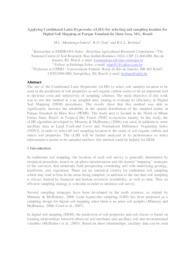Applying Conditional Latin Hypercube (cLHS) for selecting soil sampling location for Digital Soil Mapping at Parque Estadual da Mata Seca, MG, Brazil.
Applying Conditional Latin Hypercube (cLHS) for selecting soil sampling location for Digital Soil Mapping at Parque Estadual da Mata Seca, MG, Brazil.
Author(s): MENDONÇA-SANTOS, M. de L.; DART, R. de O.; BERBARA, R. L. L.
Summary: The use of the Conditional Latin Hypercube (cLHS) to select soil samples location to be used in the prediction of soil properties as soil organic carbon seems to be an important tool to decrease costs and subjectivity of sampling schemes. The main objective of this work was to test this method in a no sampled area, aiming to evaluate its efficiency in Digital Soil Mapping (DSM) procedures. The results show that this method was able to significantly increase the reliability in the spatial distribution of the sampled points in Parque Estadual da Mata Seca (PEMS). The study area is located in the North of Minas Gerais State, Brazil, in Tropical Dry Forest (TDF) ecosystems mainly. In this study, the cLHS algorithm developed by Minasny & McBratney (2006) was used, in addition to some ancillary data as Land Use/Land Cover and Normalized Difference Vegetation Index (NDVI), in order to select 60 soil sampling location to the study of soil organic carbon and others soil properties. The cLHS will be further analyzed in its performance to select representative points to be sampled and how this method could be helpful for DSM.
Publication year: 2008
Types of publication: Paper in annals and proceedings
Unit: Embrapa Soils
Keywords: CLHS, LHS, Mapeamento digital, Mata Seca
Observation
Some of Embrapa's publications are published as ePub files. To read them, use or download one of the following free software options to your computer or mobile device. Android: Google Play Books; IOS: iBooks; Windows and Linux: Calibre.
Access other publications
Access the Agricultural Research Database (BDPA) to consult Embrapa's full library collection and records.
Visit Embrapa Bookstore to purchase books and other publications sold by Embrapa.

